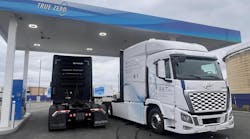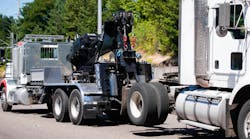Major Cliff Mirabella of USTC said that as part of the job of moving critical cargo and personnel, combat commanders are stressing the importance of automated information systems and automatic identification technology to meet the goals of total asset visibility and in-transit visibility. RFID tags are one way to provide content-level detail for containers and pallets, he said.
"We are always seeking to enhance the visibility of the end-to-end logistics pipeline," Mirabella said. "For current operations, technology enablers like RFID serve to bridge some current holes in terms of providing soldiers full-scale visibility coverage."
Mirabella pointed to an effort by the U.S. Air Mobility Command to put RFID tags on cargo pallets bound for U.S. Central Command locations in Iraq. Once loaded on military cargo planes, those pallets are tracked via RFID tags from the bases in Iraq where they are offloaded for transport to the front lines.
Mirabella said the system works like this: Airbase personnel process the cargo and check the documentation received from the shipper. Once the cargo has been placed onto a pallet and plastic sheeting is placed over the cargo, data about the cargo is then transferred to the RFID tag, which is attached to the cargo pallet with plastic ties. That tag is then tracked by the military's Total Asset Visibility (TAV) software system.
Once that information is uploaded into the Department of Defense's (DOD) information systems, it is sent out to all military locations throughout the world. That way, when the pallet is off-loaded at its final destination, fixed RFID transponders, called interrogators, automatically read the RFID tag and update all the relevant DOD information systems with the pallet’s current location.
Where there is no fixed interrogator system, hand-held interrogators can read the tag and transmit the data, said Mirabella. On top of all of that, the RFID tags are recoverable and reusable, he noted.
The system allows accurate data to be forwarded to combat personnel about the cargo they are receiving, reducing the amount of time it takes to discern what is in a particular shipment and helping ensure the right shipment is sent to the right unit and right location.


